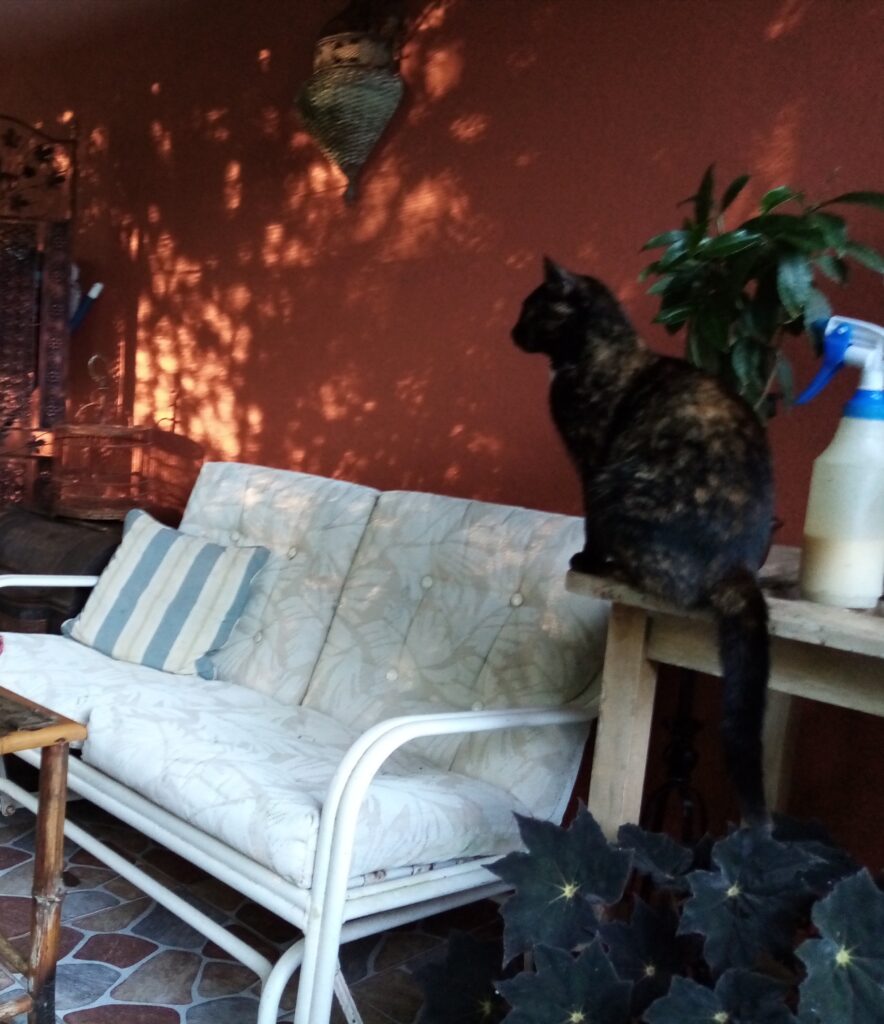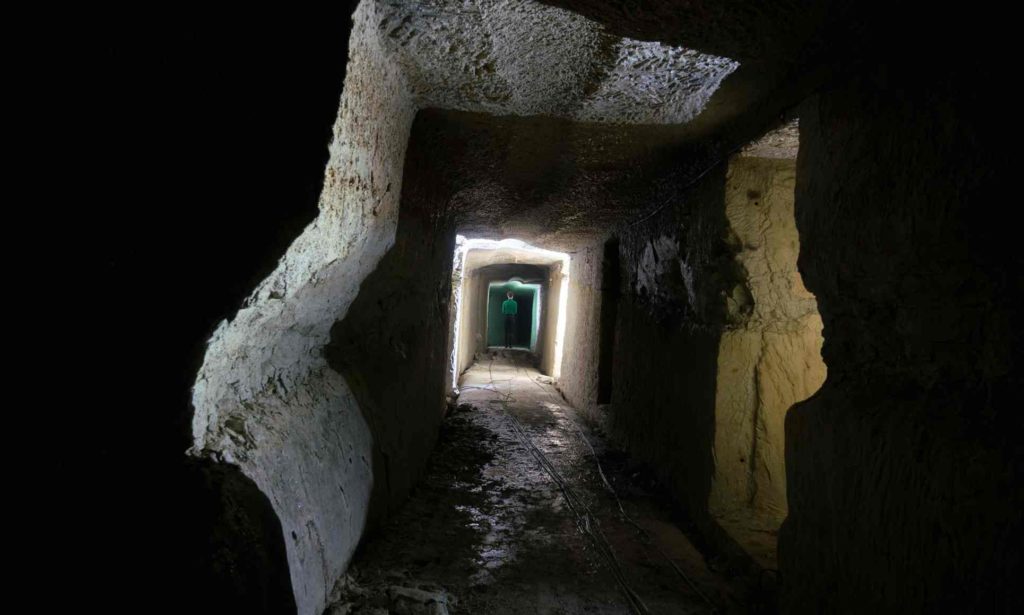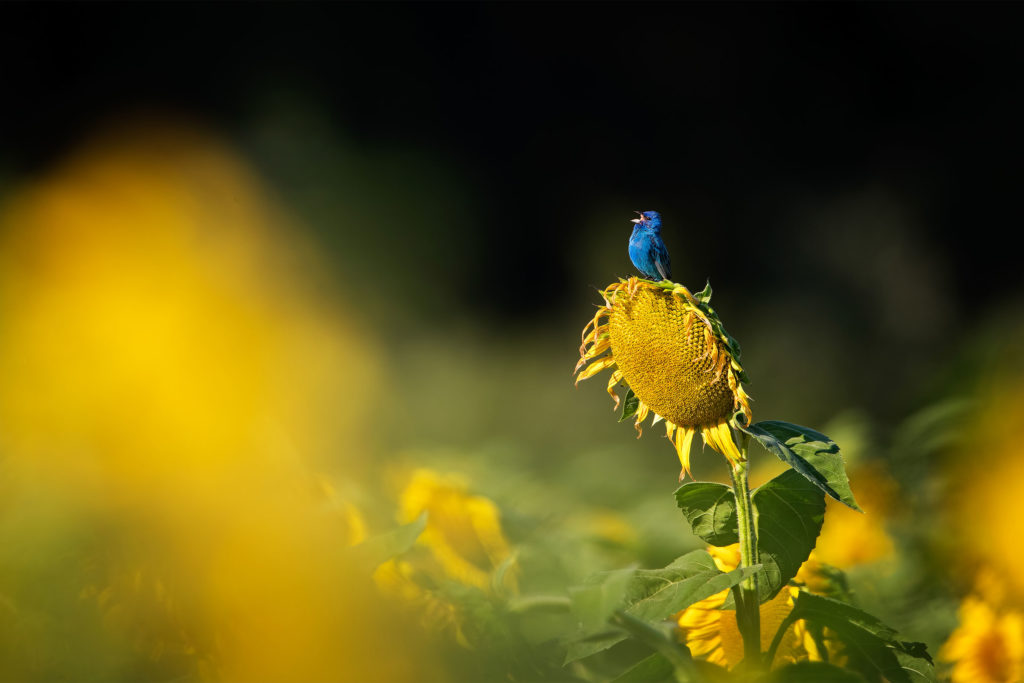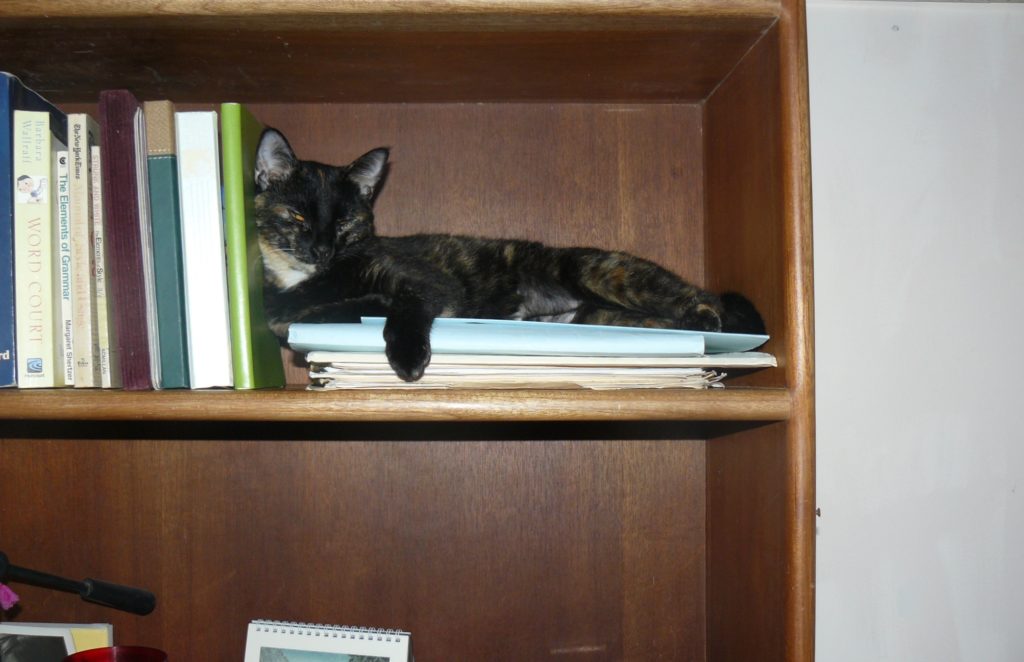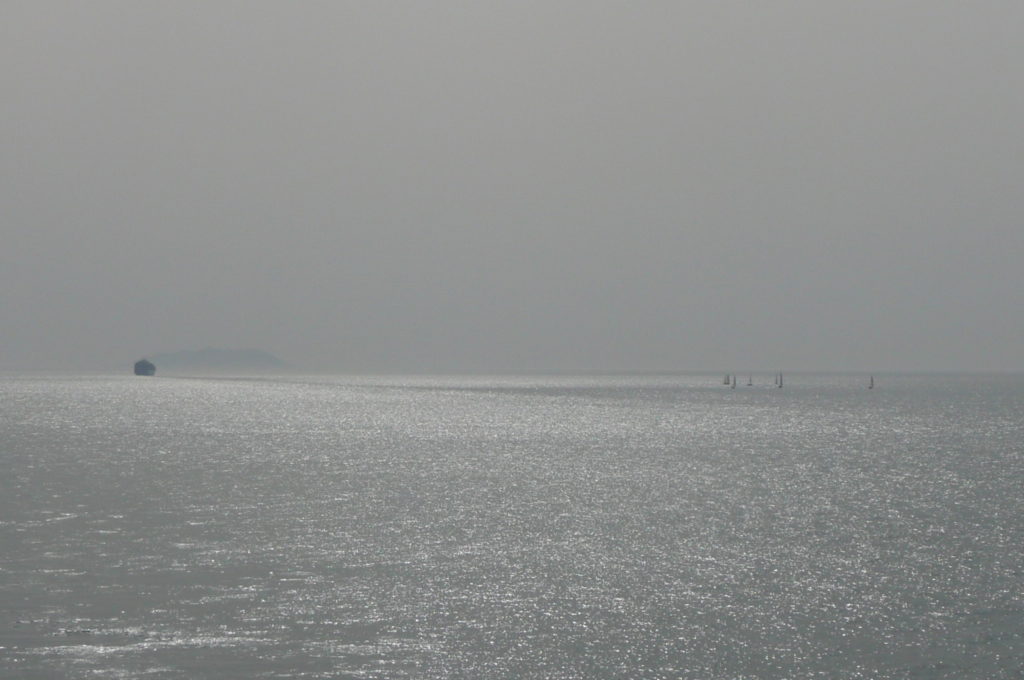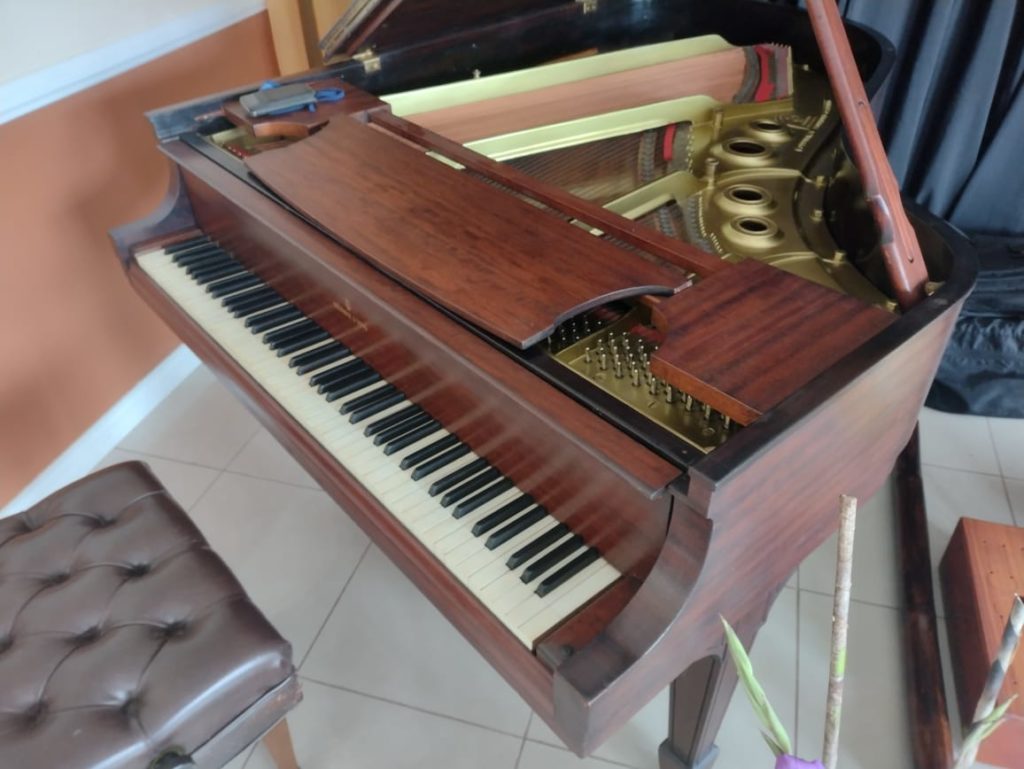Those who dwell, as scientists or laymen, among the beauties and mysteries of the earth are never alone or weary of life. Whatever the vexations or concerns of their personal lives, their thoughts can find paths that lead to inner contentment and to renewed excitement in living. Those who contemplate the beauty of the earth find reserves of strength that will endure as long as life lasts. There is symbolic as well as actual beauty in the migration of the birds, the ebb and flow of the tides, the folded bud ready for the spring. There is something infinitely healing in the repeated refrains of nature-the assurance that dawn comes after night, and spring after the winter. ~Rachel Carson
The Sense of Wonder
Author Archives
Silence
Hello chatter, my old friend.
The sounds of silence are a dim recollection now, like mystery, privacy and paying attention to one thing — or one person — at a time.
As far back as half-a-century ago, the Swiss philosopher Max Picard warned: “Nothing has changed the nature of man so much as the loss of silence,” once as natural as the sky and air.
As fiendish little gadgets conspire to track our movements and record our activities wherever we go, producing a barrage of pictures of everything we’re doing and saying, our lives will unroll as one long instant replay.
There will be fewer and fewer of what Virginia Woolf called “moments of being,” intense sensations that stand apart from the “cotton wool of daily life.”
“In the future, not getting any imagery or story line or content is going to be the equivalent of silence because people are so filled up now with streaming video,” said Ed Schlossberg, the artist, author and designer who runs ESI Design. “Paying attention to anything will be the missing commodity in future life. You think you’ll miss nothing, but you’ll probably miss everything.”
Schlossberg said that, for a long time, art provided the boundary for silence, “but now art, in some cases, is so distracting and intense and faceted, it’s hard to step into a moment. Especially when you’re always carrying a microcamera and a screen all the time, both recording and playing back constantly rather than allowing moments of composition and stillness when your brain can go into a reverie.”
I wish I had written this, but whoever did is lost to memory (especially since I didn’t write it down.) So, if anyone recognizes it, please let me know and I’ll add it here. Thanks.
May Sarton on Solitude and Creativity
It is raining. I look out on the maple, where a few leaves have turned yellow, and listen to Punch, the parrot, talking to himself and to the rain ticking gently against the windows. I am here alone for the first time in weeks, to take up my “real” life again at last. That is what is strange—that friends, even passionate love, are not my real life unless there is time alone in which to explore and to discover what is happening or has happened. Without the interruptions, nourishing and maddening, this life would become arid. Yet I taste it fully only when I am alone…
My need to be alone is balanced against my fear of what will happen when suddenly I enter the huge empty silence if I cannot find support there.
The value of solitude — one of its values — is, of course, that there is nothing to cushion against attacks from within, just as there is nothing to help balance at times of particular stress or depression.
Does anything in nature despair except man? An animal with a foot caught in a trap does not seem to despair. It is too busy trying to survive. It is all closed in, to a kind of still, intense waiting. Is this a key? Keep busy with survival. Imitate the trees. Learn to lose in order to recover, and remember that nothing stays the same for long, not even pain, psychic pain. Sit it out. Let it all pass. Let it go.
Praise for Evelio’s Garden
Evelio’s Garden continues to garner wonderful reviews:
“Why isn’t this book a best seller?Wonderful! A favorite book by a naturalist-humanist. Want to understand Costa Rica? Read this book.”
“After reading the first few pages of Evelio’s Garden, I understand the nature, the people and the heart of Costa Rica deeply, almost as if I had lived there instead of just visiting as a gringo tourist.. The author, Sandra Shaw Homer is a very gifted writer who takes you into her world, living in rural Costa Rica, near the great Arenal Volcano. With sharp observations of nature, people, and a warm and caring heart, she takes you on an intimate journey into her world, where you will love the people, the joys and struggles of her daily life, and what it is like to live in her part of the world. I think you will agree and love this book as much as I do.”
“The original and memorable memoir of an expatriate to Costa Rica who finds perspective as a writer and organic farmer. . .Well-written, with languid prose featuring occasional lushness that mirrors the Costa Rican…setting. The writer has a keen eye for detail, and merges adeptly the physical with the thematic…with a relaxing narrative pace and setting that carefully opens itself up to moments of darkness and vulnerability.”
“Sandra Shaw Homer is a profoundly gifted writer. Her prose is lyrical, evocative and at times borders on poetic. Her account of the ups and mainly downs of a year’s project with an organic vegetable garden created by her Costa Rican worker is seamlessly intertwined with recollections from her past. The descriptions of her long residence in rural Costa Rica bring to life the incredible natural beauty around her and the wildlife she sees and hears on a daily basis. I highly recommend this book.”
“Sandra’s latest book is a compelling read. She taps into all aspects of living in the tiny foreign country that we share and the obstacles, complexities, discoveries and rewards that coexist within the culture and biodiversity of the land. Her relatable story delves into the common challenges that we, who live in this particular part of Costa Rica, are very familiar with: high winds, heavy rains, roaming livestock and the plethora of insects…As we come to find out, Evelio’s chosen task of growing an organic vegetable garden is a battle against the odds. Wrought with frustration, misunderstandings, humor and awe, the author also bravely reveals and shares some of the shadow areas of her personal life. A very thought-provoking book i would enjoy reading again.”
One Day at a Time
One day at a time –
One cloud humming in a pure sky,
One dying tree,
Russet leaves falling.
The flight of one hawk calling
The laugh of one young monkey
In the towering trees,
One caught gecko cheeping
Between my cat’s teeth.
One call from a friend –
Oh, how deep this goes!
One coyote’s song
So wild, so old.
All I have to do,
While I am waiting,
Is listen
One day at a time.
SSH
10 Questions Never to Ask a Writer
Reposted from a blog by By Lauren B. Davis | January 4, 2010 | 40
I wonder how many of you have asked a writer of your acquaintance what you thought was a perfectly harmless question, one intended to show your interest in that person and what they do, only to be rewarded by a mumbled response, possibly a trembling chin, or, horrors, a glower. You walk away thinking, What’s wrong with these writer people? Have they no manners? Well, sadly, some of us don’t, but it’s more likely you’ve stumbled upon one of the questions likely to leave us at…well, a loss for words.
I don’t mean to suggest that writers are such fragile flowers that no one should approach us for fear of having us break down in puddles if asked the wrong question. Really, that hardly ever happens. But if you do detect a slight twitch, or an inadvertent sigh, perhaps it’s because you’ve asked a perfectly well-meaning, seemingly reasonable question, one that if you asked anyone else wouldn’t be a problem. However, as writers, alas, we’ve probably been asked that question a thousand times before, and wouldn’t mind at all, if we had a decent answer, but we don’t, and so we mumble and sigh and twitch and go and stand behind the potted palm where it’s safer. It’s embarrassing to stand there with a drink in one hand and a palm frond up the nose. Uncomfortable for everyone, really.
So, for next time…these are some questions writers dread, in no particular order:
1. How’s the novel coming? Well, probably not very well. Novels are wild, unwieldy beasts that resist being tamed. Really, do you want to hear how Faulkner spent twelve hours writing a scene about looking at young girl’s dirty underpants as she climbed a tree? Probably not, and that was the definitive scene in The Sound and the Fury, so imagine how much less you’ll want to read about that eel-skinning scene I labored over for hours yesterday, only to erase today. To quote Oscar Wilde, “I was working on the proof of one of my poems all the morning, and took out a comma. In the afternoon I put it back again.”
There is also a story about James Joyce wherein someone came round to see The Great Man as he worked in his Paris garret
“How are you, James?” he said. “You don’t look so good.”
“I’m terrible.”
“Is it the writing?”
“Of course it’s the feckin’ writing! It’s always the writing!”
“Can you not write then? Are you blocked?”
“I’ve written seven words today.”
“Well, James,” said the friend, “for you, actually, that’s not bad.”
“I suppose,” said the Great Man, “but now I’ve got to figure out what order to put them in.”
Thus, it’s a question for which there is no good answer, and we know it.
2. Are you writing? If I am, see 1. above. If I’m not, you really don’t want to know. The only thing worse than having writer’s block is talking about it. Having to listen to such panicked whining is recognized as torture and we wouldn’t dream of inflicting it on you.
3. Has your novel sold? Sad to say, but it’s unlikely. Publishing is a slaughterhouse these days, and even in the Good Old Days (if ever there were any), almost no one published, and of the minuscule number who did, almost none of those published a second novel. Having to answer that question over and over again is like rubbing glass in an open wound. Believe me, if there’s good news, we’ll be telling you. Heck, we’ll be telling EVERYONE! Most of us write because we can’t stop writing – it’s a sort of mental illness – and thus we do so in spite of the searing disappointments. Try not to make us talk about it.
4. When’s that new book coming out? Let’s put it this way: if, since the last time we spoke, I’ve finished the manuscript, submitted it to my agent, my agent has read it (which usually takes three months because they are busy, important folks), and loved it just as it is with no changes at all; if the agent has then in turn submitted it to editors and one of them has read it (think another few months or so, or more, since editors are also important, busy folks), and that editor LOVED it, and showed it to the sales force (the important people who really run publishing these days) and the sales force LOVED it just as it is, and made an offer……. even if ALL those things have already happened, it will still be around TWO YEARS before the book will actually come out, due to the editing and production process. So, if you’ve asked this question once in the past three years, you needn’t ask it again. Also, see 3).
5. I just love the new Dan Brown novel (or Sarah Palin’s memoir), have you read it yet? My condolences, and no.
6. How come I can’t get your books here? And by ‘here’ you probably mean America. This one may not apply to all writers, but it will to a surprising number of us. Especially if we are, say, from Canada or Britain or Ireland or Scotland or New Zealand or Australia… doubly so if we are from a country where English isn’t the first language (and no jokes about Scotland, please). Although, with some justification, America views itself as the center of the universe, people do publish in other countries, and getting published in England does not mean a writer will find a publisher in New York, which considers itself (again, with some justification) as the center of the center of the universe. Without a publishing contract in the US, the book will not be available to the US market. You could, however, go on the internet and order books from bookstores in the US or Canada or gasp, even Australia. I do it all the time.
7. Is that story autobiographical? Until my parents are all dead, the answer to that is no. I’m joking, really Mum, I am. However, it can be a bit insulting to a writer to have everyone think that a) you really were a junkie porn star homicidal trust fund baby and just kept it a secret, or that b) you haven’t the imagination to MAKE THINGS UP, which is, after all, what fiction writers are supposed to do, mostly. I will paraphrase what W. Somerset Maugham said, though, in that writers are not God, we cannot create out of nothing. Everything is inspiration and fodder, even cocktail party conversations.
8. Oh, you’re a writer! Have I heard of you? Do I know your books? I have no idea, but if not please don’t make it sound as if I’ve failed. Might I suggest, if you’re interested, you note one of the titles and buy a book?
9. How big an advance did you get? How many books did you sell? Now really, didn’t your mother ever tell you it was impolite to ask someone what they make for a living? It will either be shockingly low by your standards, or shockingly high, neither of which is useful information. People in France, where I lived for many years, never ask these sorts of particularly American questions. They ask instead, “Where can I buy one of your books?” Which is a lovely question, since it implies they are a) interested in your work, and b) interested in supporting your work by actually BUYING a book.
10. What’s the book you’re working on about? Two problems with this question: the first is that if I talk too much about it, I won’t write about it, so I don’t mean to be rude, but I don’t want to answer that question. (Most people are pretty good about that and don’t take offense, but you’d be surprised, perhaps, by how many do.) The second problem is that I may not know. I write a story that pops into my head, but I may not know what it’s really about until a long way down the line. When I was writing The Radiant City, it wasn’t until I was through the first draft, and heard Rev. Ernest Hunt, the Rector at the American Cathedral in Paris, say, “Cynicism is the last refuge of the broken-hearted” that I understood I was writing about precisely that – whether disillusionment, the kind that breaks your heart, like terrorist attacks, or war, or genocide, damns you to a life of cynicism, or if it’s possible to continue to walk through the world with a compassionate heart. (The quote became the epigram of the book. Thanks Ernie!)
And although it’s not a question, there is one statement that’s almost guaranteed to send a writer scrambling to a safe nest behind the potted palm: “I’m going to take six months off from my job and write a book.”
Legend has it this statement was made to either William Styron or Margaret Lawrence, depending on who’s telling it, by a heart surgeon at a cocktail party. As in, “I just loved your book so much, and you’ve inspired me. I’m going to take six months off from my job and write my own memoir.” “Really,” replied William/Margaret. “Well, you’ve inspired me as well. I’m going to take six months off from writing and become a heart surgeon.”
I wouldn’t have the guts to say that, but I admit it, I do think it from time to time. It takes as long to learn to be a good writer as it does to do anything else – play the violin, perhaps, or architecture, or yes, heart surgery. And just like those things, having just a soupcon of talent doesn’t hurt.
So at this point you might be asking yourself what you CAN ask a writer. Well, we love talking about books we’ve enjoyed, as well as anything else that inspires us. And as writers we tend to watch the world pretty closely, since you never know when a story worth writing about may pop up, so current affairs are just as interesting to us as to anyone else. Then too, if we’re well-brought up, psychologically stable folk (and some of us are), we probably think YOU’RE pretty interesting. You might not want to answer questions about, say, how much you make for a living, and I wouldn’t dream of asking you, but I’d be fascinated to learn, for example, what you believe and how you came to believe it. I’d like to know how you met your spouse, and what you think about the death penalty, and why; and what you think about censorship, and that story about fly-fishing, and the one about the rescue dog, and what you think it means to be a good person… oh, there’s a world of things out there to talk about, isn’t there?
I Thought the Ocean was Forever
From The Guardian
We hear the call of the sea in poems from Coleridge and Eliot to Kathy Jetn̄il-Kijiner, but those words also sound a warning – if only we would listen
David Farrier, Mon 26 Dec 2022
TS Eliot wrote The Dry Salvages as second world war bombs fell on London. The poem imagines humanity adrift in a leaky boat, the sea “all about us”. But poetry, like the sea, is never still. “Where is there an end to the drifting wreckage,” the poem asks. The answer: “There is no end, but addition” reads differently in 2022 than in 1941, as 12m tonnes of plastic are added to the oceans each year.
Reading is tidal, and each tide brings with it new associations. It is difficult now to read John Masefield’s Sea-Fever without thinking of bleaching coral, or Samuel Taylor Coleridge’s The Rime of the Ancient Mariner without picturing Chris Jordan’s photographs of dead albatross, their stomachs full of brightly coloured plastic. “‘Hope’ is the thing with feathers,” but avian flu is decimating seabird populations.
Poetry, both old and new, not only reveals the oceans’ uncanny beauty, it also frames the monstrous dilemmas of rising seas, pollution, and declining biodiversity.
Marshallese poet Kathy Jetn̄il-Kijiner’s collection Iep Jaltok confronts the existential challenge of sea-level rise for island nations. In 2 Degrees, her infant daughter’s fever prompts a bitter reflection on the arrogance of fossil fuel-consuming nations: the difference between 1.5C and 2C “Seems small … just crumbs / like the Marshall Islands / must look / on a map”. Jetn̄il-Kijiner was the Marshall Islands’ climate envoy at Cop27, and criticised the failure to phase out fossil fuels even as developing nations celebrated the loss and damage fund.
“The call of the running tide / Is a wild call and a clear call that may not be denied;” writes Masefield in Sea-Fever. Likewise, the Marshall Islands’ claim to a liveable future in the face of rapidly rising tides is – or ought to be – irresistible.
There is hope in these poems, but it’s something made in the face of grim predictions. Two poems, arranged to resemble baskets, bookend Jetn̄il-Kijiner’s collection, the words like tiny atolls in the white sea of the page:
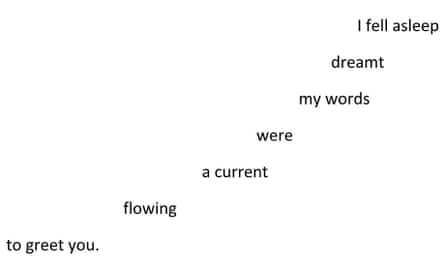
The loss of indigenous cultures washes away whole worlds. Among the Inupiaq of Alaska, seals, whales and seabirds are people. Even “Oil is a People,” writes Inupiaq poet dg nanouk okpik. Throughout her collection Corpse Whale, okpik uses a split pronoun, “she/I”, to express this sense of shared personhood. “Will they crawl around her / me, sink their eyeteeth in the sea,” she asks in If Oil is Drilled in Bristol Bay.
“Where they want / to claim the sea for roads,” she writes in No Fishing on the Point, “She’s/I’ve watched the currents, / […] / which bring […] feasts, and famine.”
For much of human history, the sea’s vastness has suggested eternity, a metaphysical space into which we have poured both our dreams and our waste. There are at least 415 marine dead zones around the world, areas so polluted by nitrogen and phosphorus that the water is free of oxygen. Like the “the rotting sea” of Coleridge’s poem, where “a thousand thousand slimy things / Lived on;” nothing can survive in a dead zone, except jellyfish and bacteria. “Globe globe globe globe,” pulses the jellyfish in Les Murray’s poem, Jellyfish, intimating both its soft-bodied shape and the prospect of a future ocean dominated by anoxic life.
But poetry isn’t science; not bound simply to report on the state of things, poetry is free to imagine what could be. Brenda Shaughnessy’s The Octopus Museum presents a future Earth ruled by cephalopods, creatures whose intelligence is proof that, as the philosopher Peter Godfrey-Smith puts it, “the mind evolved in the sea”. In Caleb Parkin’s day-glo collection This Fruiting Body, chromatophoric creatures rave (“your skin / sings eight-thousand synthesised octopoid loops”) and Ecco the Dolphin, the hero of Sega’s 1990s video game classic, “roves immaculate 16-bit oceans”.
Parkin’s poems celebrate a fluid nature uncontained by binary thinking. A carrier bag floating in the sea becomes “a lazy misremembering / of plankton masses”. The synthetic and the organic flow into one another. That fluidity can be deadly: turtles eat plastic bags because they resemble “the ghost of a jellyfish”. But Parkin’s carrier bag wants no more than “to unpack itself […] / to become once again bustling plankton masses.” We know some bacteria colonise marine plastic, and have even evolved to metabolise it. The force underpinning all life, Parkin reminds us, is desire.
Desire is also the main current of The European Eel, Steve Ely’s lush recreation of the incredible transatlantic migration eels undertake to their spawning grounds in the Sargasso Sea. Little is known about their ocean-going lives, but in Ely’s telling it becomes a testimony to life’s irrepressibility. A female eel will gradually consume her own body to fuel the journey, “reducing herself to the seed of her species’ future”. It culminates in an ecstatic account of eel sex, coiling in billowing clouds of golden milt and ova, “sparks from the cornucopian flame / of Archaea’s unkillable, dark pleroma”.
Life thrills in the shallows as well as the deep. The glory of the foreshore is celebrated in Of Sea, Elizabeth-Jane Burnett’s bestiary of the intertidal zone. Mud shrimp drifting with the tide float in “silk light”; ragworm, burrowing in estuarine mud, shimmer “in all the love of being”.
We might say a poem is a bit like a boat, a vessel borne aloft by rhythms that surge or eddy. It is also like the sea itself, with its deep places and ever-receding horizon. “The sea has many voices,” observes Eliot in The Dry Salvages. More than anything, the many voices of oceanic poetry declare the vitality of life even in the midst of crisis. “There is a lullaby in all of us,” Burnett writes, “a call of sea”. If only we would listen.
David Farrier is professor of Literature and the Environment at the University of Edinburgh, and the author of Footprints: In Search of Future Fossils
Perspective
I am standing on the seashore. A ship at my side spreads her white sails to the morning breeze and starts for the blue ocean. An object of beauty and strength, she sails into the distance diminishing in size, until she hangs like a speck of white cloud where the sea and sky mingle.
Then someone says, “There! She’s gone.” Gone where? Gone from my sight—that’s all. She is just as large in mast and hull and spar as she was when she left my side, and she is just as able to bear her load of living freight to the place of her destination.
But her diminished size is in me, not in her; and just at the moment when that someone at my side says, “There! She’s gone,” there are other eyes watching her coming and other voices ready to take up the glad shout, “Here she comes!”
Henry Van Dyke
Endings
In literature, we have a chance for closure. We can put the punctuation mark wherever we like, whether it marks the end of grief, the beginning of a relationship, the birth of a child, the end of a life, or the decision to live again. . . . Writers are not seers. Armed with the “knowledge of what has gone before,” we mold events, truths, into narrative, and hope and know that the last punctuation mark is not the end, but the invitation to begin again.
http://blog.pshares.org/index.php/author/evdecleyre
When the Music Plays You
“I love trying to spin the world into a web of words. And I love those times when it feels like those words turn into a world of their own.” — Rose Auslander
I am seventeen and practicing the piano. I go at it two hours a day, and no longer need the nagging of my parents, when I used to prefer playing softball after school. The work itself is its own reward, playing a passage over and over at different rhythms, until it comes out smooth as silk.
I rarely practice after dark, since I don’t want to disturb my father, who may have brought work home. But now that I’m on the yearbook committee, there are days when I simply have to. It’s winter and the room is dark except for the light over the piano, and I feel my father’s entrance and his quiet sigh as he sits down well away from the piano and me.
It is near the end of my practice session, when I play something for pure pleasure, and tonight it’s a Schubert impromptu, a piece I love to play, complex and romantic. I am aware that my father is in the room; I am aware of all the ambiguities of our relationship; I know, however, that my ability to play so well has pleased him, and that falls into the complexity of Schubert, me, my father, the abuse, all the pain of never knowing if he has loved me or not.
Somehow, I throw myself into the music, I become the music, the music — Schubert — is playing me. It’s transformative. I am no longer in this darkened living room. My father is still here, because there is a musical line connecting us, and I thrill as the phrases and chords and notes become a world of their own — a world described by incredible beauty and freedom. And at the end, I bow my head over the keys and feel full of the act of love I have just performed.

